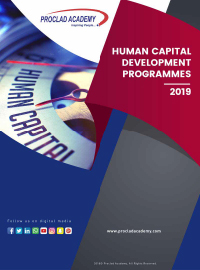Advanced Project Risk Management
| Ref No. | Dates | Venue | Fee (US$) | |
|---|---|---|---|---|
| PM 003 | 23 - 27 Feb 2020 | Dubai | 4500 | Register |
| PM 003 | 26 - 30 Jul 2020 | Dubai | 4500 | Register |
| PM 003 | 20 - 24 Dec 2020 | Dubai | 4500 | Register |
Advanced Project Risk Management
Introduction
Project Risk Management lies at the very core of successful project delivery. Project failure results in the failure to achieve the organisation’s financial and strategic objectives, often with sizable increases in project cost and with substantial financial losses to the organisation. Accordingly, the systematic identification and quantification of project risks, as well as the development of detailed risk treatment strategies to mitigate all relevant risks that threaten the intended outcomes of the project, are essential to the achievement of project success.
PROCLAD Academy’s 5-day training course on Advanced Project Risk Management will enable delegates to apply the tools and techniques of modern project risk management effectively in order to deal with a wide variety of risks and uncertainties related to the project. The training course does not assume any prior knowledge of the topics covered. New concepts and tools are introduced gradually to enable participants to progress from the fundamental to the advanced concepts of project risk management.
The key features of PROCLAD Academy’s Advanced Project Risk Management training course are:
- Identifying risk categories related to your organisation’s operations and projects
- Identifying project-specific risks and uncertainties related to design, planning, operation and maintenance
- Using a proven set of skills and techniques for the quantification, analysis and mitigation of identified risks
- Developing a systematic and dynamic Risk Management Plan
Learning Objectives
By attending PROCLAD Academy’s Advanced Project Risk Management training course, delegates will learn how to:
- Identify project-specific risks and uncertainties related to project design, planning, execution and operation
- Identify technical parameters, specifications and the project schedule
- Use qualitative and quantitative methods to assess the exposure of the project to particular risks in real and measurable financial terms
- Prioritise and rank risks in order to deal with them systematically
- Apply the concept of expected monetary value to develop adequate contingency levels
- Employ the six primary risk treatment strategies to develop pro-active responses to potential risks
- Apply a dynamic risk mitigation process to reduce the risk profile to comply with organizational thresholds
Target Audience
PROCLAD Academy’s Advanced Project Risk Management training course is designed for:
- Project Team Leaders
- Project Planners and Scheduling Staff
- Production Engineers
- Project Professionals
- Staff Members Responsible for or Involved in Project Risk Management
Training Methodology
Participants on this PROCLAD Academy training course will develop advanced project risk management skills and knowledge through formal and interactive learning methods. The course includes individual exercises, team projects, applicable case studies, group discussions and video material that will bring to life the skills acquired throughout the course.
Course Outline
- Definitions – What is Risk?
- The Triple Constraint & Stakeholder Analysis
- Risk Management Processes & Model
- Establish risk context and criteria
- Identify the risk events, risk triggers (causes), and risk receptors (effects)
- Analyze risk events by qualitative or quantitative methods
- Formulate risk treatment strategies and analyse the effect of each on the risk cost
- Implement the selected risk strategies
- Identifying Potential Risk Events
- Techniques for Identifying Risk Events
- Identifying Triggers, Indicators and Receptors
- Risk Scenario Description
- Qualitative and Semi-Quantitative Risk Analysis Techniques
- Risk Matrices and Risk Ranking
- Techniques for Identifying Risk Events
- Regular expert panel meetings
- Brainstorming
- Delphi technique
- Nominal group technique (NGT)
- Crawford slip
- Fishbone Diagramming
- Qualitative Descriptions of Probability
- Qualitative Descriptions of Impact
- Qualitative Risk Analysis Matrix
- Risk Response Strategies
- Progressive Risk Management Plan Development
- Detailed Risk Quantification and Prioritization
- Risk Characteristics
- Risk Matrices and Risk Ranking
- Estimating Probability
- Estimating Impact
- Weighted Probability & Impact Rating
- Risk Ranking
- Progressive Risk Management Plan Development
- Expected Monetary Value Concepts (EMV)
- Risk Quantification and EMV
- Decisions Under Conditions of Uncertainty
- Progressive Risk Management Plan Development
- Detailed Risk Quantification and Prioritisation
- Expected Monetary Value Concepts
- Risk Quantification and Expected Monetary Value
- Best case scenario
- Base case scenario
- Worst case scenario
- Decisions Under Conditions of Uncertainty
- Risk Treatment Objectives
- Procedure for Risk Strategy Development
- Risk Response Development Matrix
- Risk Strategy Development and Implementation
- Forecasting Annual Project Cash Flows over the Economic Life
- Financial Scenario Planning and Risk Mitigation
- Risk Quantification and Expected Monetary Value
- Scenario Planning
- Developing Risk Mitigation Strategies
- Procedure for Risk Strategy Development
- Risk Response Strategies
- Risk Acceptance
- Risk Prevention
- Risk Avoidance
- Risk Mitigation
- Risk Transfer & Contracting
- Implementing Mitigation Strategies
- Multiple Option Decisions
- Combining Risk and Cash Flow Analyses


